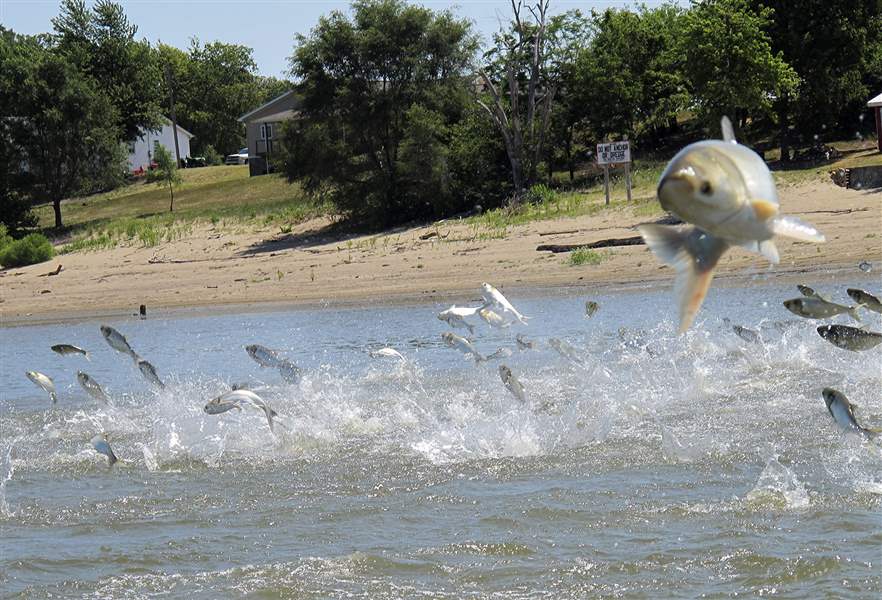
Asian carp ‘fatigue’ threatens Great Lakes
Boat captains call on Congress to renew efforts to address potential invasion
8/3/2016
Asian carp, jolted by an electric current from a research boat, jump from the Illinois River near Havana, Ill., during a 2012 study on the voracious fish’s population.
ASSOCIATED PRESS
Great Lakes charter boat captains are calling on Congress to refocus efforts on Asian carp, the exotic species with a voracious appetite that many fish biologists fear would wreak havoc on the region’s $7 billion fishery if they ever became established in it.
Those fishing captains are one of the groups with the most to lose, because they are highly dependent on a diverse mix of fish species to make their businesses more attractive. That’s especially true in Lake Erie, where more fish are spawned than the rest of the Great Lakes combined.
In a conference call Tuesday, charter boat captains said they aren’t sure if it’s election politics that has put the Asian carp issue on hold.
They expressed frustration with the pace Congress has taken since being presented with a landmark report 2½ years ago in which the U.S. Army Corps of Engineers laid out several possible engineering solutions, the most expensive being a physical separation of the Great Lakes and Mississippi watersheds at a cost of $18.4 billion. That is the option most Great Lakes scientists advocate.
Dave Spangler, Lake Erie Charter Boat Association member and owner of Dr. Bugs Charters in Oak Harbor, Ohio, said keeping the issue in front of Congress is “a serious thing” because western Lake Erie — with its warmth, shallowness, and world-class spawning areas — would be “utopia for Asian carp.”
“Walleye, yellow perch, and smallmouth bass would go away,” Mr. Spangler said.
He said Ohio’s $14 million lake-based tourism would take an irreversible hit.
“Our mission is to make sure all of our future generations can enjoy Lake Erie,” Mr. Spangler said.
He and others agreed their disagreement isn’t with the Great Lakes congressional delegation, which for years has been largely supportive of Asian carp legislation and funding efforts. But the delegation itself has expressed frustration several times over efforts to get congressmen from other parts of the country to embrace the issue.
“I haven’t heard anything at all this year. That’s part of our frustration,” Mr. Spangler said. “It seems like they’ve got Asian carp fatigue.”
U.S. Rep. Marcy Kaptur (D., Toledo), who co-chairs the Great Lakes task force in the U.S. House, has been critical of the pace Congress has been on for years.
But she said on Tuesday that she is encouraged by movement on some funding projects.
Guy Lopez, owner of Wild Dog Tackle and Good Guyde Service in Illinois, said he has firsthand experience along the Illinois River with silver Asian carp, a species that becomes a missile-like projectile when boats come by because it is highly sensitive to motor vibrations.
Silver carp and bighead carp are two of four species of fish generally classified as Asian carp, and the ones that get the most attention because of their destructive tendencies.
“I watched one of the carp fly two feet over my boat. It could have broken my windshield,” Mr. Lopez said. “I’d hate to see this happen to the Great Lakes.”
Fishermen lauded efforts in Fort Wayne, Ind., where officials have replaced a temporary fence with a permanent berm that separates the carp-filled Wabash River from the Maumee River, which flows northeast into Lake Erie near Toledo and has some of the region’s best spawning habitat.
The two waterways weren’t normally connected, but there are many times they have been when the rivers were running high from heavy spring rain.
The most logical next step, charter fish captains said, is for the U.S. Army Corps of Engineers to expedite its plans for an $8.2 million study of work that could be done near the Brandon Road Lock and Dam in Joliet, Ill.
That project, if authorized, could establish a single point to block the one-way, upstream transfer of exotic species from the Mississippi River basin into the Great Lakes basin, according to a Corps report.
Contact Tom Henry at: thenry@theblade.com, 419-724-6079, or via Twitter @ecowriterohio.